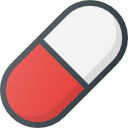
Decacycline
Form: Capsule
Strength: 250mg
Generic Name: Tetracycline Hydrochloride
Company: Beximco Pharmaceuticals Ltd.
MRP:৳ 2.2 (Capsule)
Is Antibiotic: Yes
Indications
Decacycline is used to treat various infections, including rickettsial infections like Rocky Mountain spotted fever and scrub typhus. Decacycline also treats infections caused by Mycoplasma pneumoniae, which is common in places like barracks. Decacycline is effective against chlamydial infections, including psittacosis (a disease caught from infected birds). Decacycline helps in treating non-gonococcal urethritis, Lyme disease, brucellosis, and other infections like cholera and relapsing fever. Decacycline is also used for treating acne, urinary tract infections, bronchitis, pelvic inflammatory disease, and travelers’ diarrhea. Decacycline is sometimes used for syphilis in penicillin-allergic patients and for anaerobic infections.
Pharmacology
Decacycline works by stopping bacteria from making proteins, which is crucial for their growth. The drug is absorbed into the body and binds to bacteria inside, preventing them from producing proteins. Decacycline is effective against many bacteria, but some bacteria, like certain staph and strep strains, may resist Decacycline. Decacycline is still used for some urinary tract infections and infections caused by Brucella species, cholera, and Vibrio vulnificus. Tetracycline is not well absorbed in the body, with 60-80% of the dose becoming available. Decacycline is widely spread in body tissues and fluids and has a half-life of about 12 hours. Decacycline is removed from the body through urine and feces.
Dosage & Administration
Adults: The usual dose is 1-2 grams per day, split into 2-4 doses. Children over 8 years: The usual dose is 25-50 mg/kg daily, divided into 2-4 doses. Alternatively, some doctors suggest children get 0.6-1.2 grams per square meter of body surface daily.
For acne: 250 mg four times a day or 500 mg twice daily for 1 week, then 125-250 mg for several weeks. For staph infections: 1-2 grams per day for 10-14 days. For streptococcal infections: 1-2 grams per day for 10 days. For brucellosis: 500 mg four times a day with streptomycin for 1 week, then continue without streptomycin. For syphilis: 30-40 grams in divided doses over 10-15 days.
Interaction
Its absorption may be reduced by antacids containing aluminum, calcium, magnesium, or iron, and by certain other medications like kaolin-pectin, bismuth subsalicylate, and sucralfate. Decacycline may reduce the effect of penicillin and interfere with birth control pills. Decacycline can increase the effect of blood thinners, and its side effects may worsen if taken with diuretics or certain other drugs. Decacycline may also increase the effects of insulin or sulfonylureas in diabetic patients.
Contraindications
Decacycline should not be used by patients who are allergic to tetracycline or have systemic lupus erythematosus. Decacycline should also be avoided in patients with severe kidney problems, unless the dose is adjusted.
Side Effects
Decacycline can cause teeth and bone problems if taken during pregnancy or in young children, such as gray-brown discoloration of teeth. Other side effects include allergic reactions like rashes, nausea, and stomach discomfort. Decacycline may also make your skin more sensitive to sunlight. Gastrointestinal issues like nausea and vomiting can occur, especially with higher doses. Decacycline can also lead to kidney problems in people with existing kidney issues and may cause infections like oral thrush.
Pregnancy & Lactation
Decacycline should not be used during pregnancy as Decacycline can harm the mother and baby. Decacycline may cause permanent damage to the developing fetus, especially in terms of bone growth and tooth discoloration. Decacycline should also be avoided during breastfeeding and in children under 8 or 12 years old.
Precautions & Warnings
Care should be taken when Decacycline is given to people with liver problems. High doses should be avoided, and Decacycline should not be used with other liver-damaging drugs like erythromycin or sulfonamides.
Overdose Effects
N/A
Therapeutic Class
Tetracycline group of drugs.
Storage Conditions
Store between 20-25°C.
Similar Brands of Tetracycline Hydrochloride (Capsule – 250mg)
| Brand Name | Form | Strength | Company | MRP (৳) |
|---|---|---|---|---|
| A Tetra 250 | Capsule | 250mg | The ACME Laboratories Ltd. | 0.0 |
| G Tetracycline | Capsule | 250mg | Gonoshasthaya Pharmaceuticals Ltd. | 1.0 |
| Indotetra | Capsule | 250mg | Indo-Bangla Pharmaceuticals Ltd. | 0.8 |
| Jmycin | Capsule | 250mg | Jayson Pharmaceuticals Ltd. | 1.31 |
| Servitet | Capsule | 250mg | Novartis (Bangladesh) Ltd. | 0.0 |
| Taracilin | Capsule | 250mg | Doctor’s Chemicals Works Ltd. | 0.0 |
| Tetclin 250 | Capsule | 250mg | Pacific Pharmaceuticals Ltd. | 1.0 |
| Tetracycline | Capsule | 250mg | Bristol Pharma Ltd. | 1.8 |
| Tetracycline H | Capsule | 250mg | Hudson Pharmaceuticals Ltd. | 1.0 |
| Tetracyn | Capsule | 250mg | Renata Limited | 1.22 |
| Tetragen | Capsule | 250mg | General Pharmaceuticals Ltd. | 1.36 |
| Tetramet | Capsule | 250mg | Medimet Pharmaceuticals Ltd. | 1.37 |
| Tetramin | Capsule | 250mg | Gaco Pharmaceuticals(G.A Company Ltd) | 1.0 |
| Tetramycin | Capsule | 250mg | Asiatic Laboratories Ltd. | 1.3 |
| Tetram | Capsule | 250mg | Ambee Pharmaceuticals Ltd. | 1.33 |
| Tetrasina | Capsule | 250mg | The Ibn Sina Pharmaceutical Ind. Ltd. | 1.75 |
| Tetrazen | Capsule | 250mg | Zenith Pharmaceuticals Ltd. | 1.0 |
| Tetra Cap | Capsule | 250mg | Albion Laboratories Ltd. | 0.0 |
| Torin 250 | Capsule | 250mg | Team Pharmaceuticals Ltd. | 0.0 |